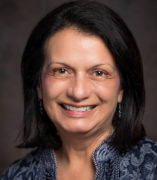University Scholar Yolanda Suarez-Balcazar
The University Scholars Program honors faculty members for superior research and teaching, along with great promise for future achievements. The award provides $15,000 a year for three years.
Yolanda Suarez-Balcazar
Professor, Occupational Therapy
Affiliate faculty, Disability and Human Development and Psychology
Years at UIC: 20
What are your research interests?
Throughout my career, I have been interested in conducting research with a community-engagement and community-based participatory research approach. My areas of research focus on understanding and addressing health disparities experienced by Latinx with disabilities and their families. I have been identifying the social determinants of health that impact Latinx families of children with disabilities and designing, along with families, culturally relevant interventions to promote healthy lifestyles and health equity. My work has also focused on promoting cultural humility, diversity, equity and inclusion. I am currently involved on a federally funded project in which we are designing a “promotoras” (community health workers) intervention to support the health and well-being of Latina mothers of children with disabilities. I am also involved on two other projects designed to promote health literacy and cultural humility among health care providers and community health workers.
How did you become interested in these topics?
I became interested in these areas back when I was growing up in Bogota, Colombia, in a large family of 12 kids. My family was involved in several community efforts to support low-income families and street children. While a graduate student at the University of Kansas, I was exposed to independent living and community participation research in collaboration with the disability community. Since moving to Chicago, I realized that Latinx immigrant families of children with disabilities in general have little access to resources, tend to have poor health status and often lack knowledge of their rights. Besides, obesity and health concerns are prevalent in the Latinx community with disability.
What do you teach?
I currently teach a graduate seminar on Race, Culture and Health Disparities, and another elective on Program Evaluation. I created both courses as I saw the need based on students’ feedback and neither course was being offered in the college. I also teach some of the diversity, equity and inclusion content to our entry-level occupational therapy students. This includes a workshop on cultural humility and implicit bias.
How do you balance teaching and research?
About balancing my teaching and research, my department fosters synergies between our research, teaching and service endeavors. My research focuses on issues of race, culture and health disparities as well as designing, implementing and evaluating culturally relevant interventions. I embed my research into my teaching and the teaching helps me keep up with the literature in these areas, optimizing both activities, and allows me to work closely with students interested in these topics. I truly enjoy working with and mentoring students.
What’s your advice to students who want to focus their future careers on research?
- Focus on areas that you are passionate about.
- Engage with communities to learn from them what matters most. We might bring knowledge of theories, methods, concepts and evidence of best practices, but we need to collaborate with community members to learn from them what matters most and how they are addressing the issues that matter to them on a daily basis. See knowledge creation as a close collaboration between academia and communities of interest.
- Volunteer in the community and get involved.
- Explore other ways of thinking, seeing and doing outside of the Western world. Critically think about ways to become a champion of justice, diversity, equity and inclusion.
- Be humble and ask critical questions. It is OK not to know all the answers. Think of research as opportunities to engage with communities to find those answers regarding pressing social and health issues facing the work today.
- Have an open mind to explore new ways, be global and become an agent of change.

